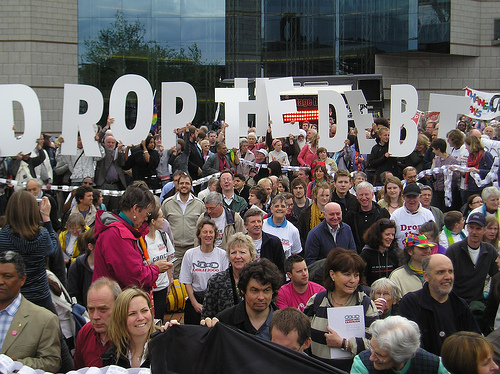

By Simon Barrow
One of the most remarkable achievements of the Queen’s courtiers on the occasion of her diamond jubilee is the way in which a thick curtain has been drawn between the patronage, power and unaccountable wealth embodied in monarchy, and the deepening inequality and injustice felt by those living at the sharp end of “austerity Britain”.
It is as if we naturally lived in parallel universes. This is nowhere more clearly demonstrated than in the misuse of the term “jubilee” itself. In the colourful symbolism of this weekend’s celebrations, the word has become synonymous with the pageant of inherited privilege. People are called on to the streets to laud and honour those who will forever live in opulent isolation from them.
But there is an entirely different meaning, history and narrative of jubilee buried beneath this weekend’s flotillas and bunting. It not only predates modern royal usage by many centuries, it also encourages the very opposite of obeisance to celebrity riches. It is the ancient Hebrew tradition of seeking the equalisation of land, property and ownership rights through seven cycles of “sabbatical years”.
This biblical jubilee also shaped the commitment of Jesus and the early Christians to stand alongside the poor and dispossessed, rather than with the representatives of empire. “Remit our debts, as we remit the debts of others” is at the core of what we call the Lord’s prayer. The phrase was later sanitised into “forgive us our sins”, in order to turn wrongdoing into a purely personal matter removed from the harsh realities of economic and political injustice.
That switch, as much as the burying of the subversive demands of the Torah which set out the original demands for a jubilee of sharing, suited those who wanted to turn Christianity (and, indeed, all religion) into a tool of the establishment and the status quo.
So the royal jubilee was invented as a rationale for accepting, personalising and ritualising the most spectacular political and economic divisions in our society. This represents not just a denial of its original, subversive symbolism, but also a massive reversal of expectations. Inequality is now seen as the norm, regardless of how much harm it does to our shared humanity.
In historical terms there are extensive disputes about how far original jubilee injunctions on land reform and redistribution of wealth were implemented. In ancient Israel, too, there were those whose sole business was to thwart the equalisers. Biblical scholar Walter Brueggemann talks of “two trajectories” in the Hebrew scriptures. One is a centralising, wealth accumulating, monarchical tradition. The other is a radical, popular and prophetic movement – one that leads Mary to celebrate the birth of Jesus by singing about how God “throws the mighty from their thrones”.
The original jubilee isn’t obscure history, nor something to be dismissed under the rubric of “religion”. In recent times, people of many beliefs and none have picked up the levelling language of jubilee to campaign for debt cancellation and poverty elimination. The current Jubilee Debt Campaign continues to turn the spotlight on tax evasion, speculative finance and unaccountable corporate capital.

Interestingly, churches in Britain tend to marginalise their roots in the radical jubilee, falling instead for a collective, choreographed curtsey to royalty. They forget that in their Bibles the monarchy was established in defiance of the divine will expressed by the prophets. They warned that it would lead to the false worship of power, expropriation of wealth, standing armies and oppressive taxation. Rightly, it would seem.
However, there is always the opportunity to stop and head in a new direction. At a time of massive financial crisis, the “jubilee economics” of making wealth accountable to ordinary people rather than the other way round is precisely what is needed. That and pageants which celebrate the need to build a common life rather than one that benefits only the few.

jeffrey daviesJune 4, 2012 at 3:09 pm
its the banks caused it they are bankrupt partys and we got to bail them out ,whilst doing this the banks have still thier snouts in the feed troughs ussing our money to pay themselves big bonuses ,while we suffer its not the the rich holding up the banks but the poorer of society as these make better targets and more of them to fleece thus leaving the rich and banks to start all over again ,when will the people rise and throw out our politicians as they have not learned how to gowen us and also got thier hands in our till and when caught have the front to deny it and to carry on as if nothing happened jeff3
ReplyLinkQuote
Well unfortunately its is those in the USA who bang their bibles the loudest , who are also the biggest offenders, the harshest, cruelest and sickest minds you could even encounter, yet these self same people will claim they are following the very god of which the ideas in this article are based. The truth is religion is historically based and totally subjective according to who and where you are in the timeline of history. Therefore to use it as a basis for any satisfactory solution to the current crisis situation is simply a non starter in my opinion. Especially as in the UK the church is an oppressor and part of the establishment and will do whatever it takes no matter how wrong, just to get a seat at the table.
We would be Better Off without the Windsors upon the Throne just as we would be
Better Off with a Decent Government and Decent Policies than this present
Diabolical Situation
” Faith Hope and Charity but the Greatest of these is Charity “